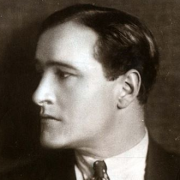The beauty queen and a mysterious maritime death
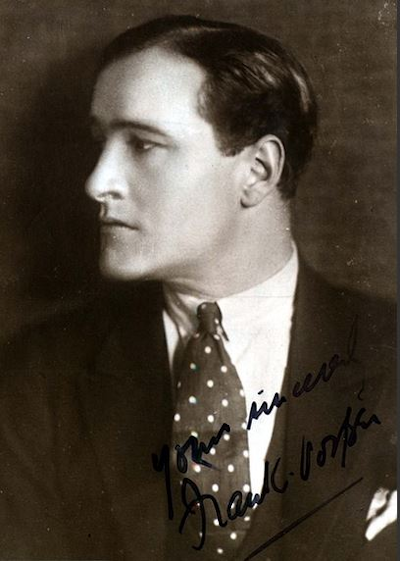
Frank Vosper
Frank Vosper was born in December 1899, just two weeks before the turn of the century. He was born at 24 Gondar Gardens in West Hampstead – the house where Nobel prize-winning novelist Doris Lessing lived for more than 30 years before her death in 2013.
Vosper’s father Percy was a surgeon at Kings College Hospital, having come from Plympton in Devon to study medicine in London. In 1894, Percy married Blanche Permain, whose father was a fine art dealer and they had moved to Gondar Gardens at the end of 1896.
Frank would have had a comfortable upbringing, yet the story of his premature death at just 36 would have made as good a film as any he might have acted in, with a cast list that included Ernest Hemingway and Miss Great Britain.

24 Gondar Gardens
Frank Vosper was educated at Haileybury School in Hertfordshire. He wanted to be an actor, and when he left school at 17 he called on a theatrical agent who had previously been a pupil at his old school. Incredibly, just on the basis of this shared experience, the agent got him work and young Frank appeared in ‘Julius Caesar’ in March 1919 at the Pavilion Theatre in Mile End.
Frank was talented, and became a very successful actor. After working with actor-manager Sir Ben Greet’s Shakespeare Company, Frank first appeared in the West End in ‘The Young Visitors’ in 1920. After this he left on a theatre tour of India and the Far East. On his return in 1922 he played a succession of both modern and Shakespearean roles. In 1926, Frank joined the Old Vic Company and worked with some of the great actors of the day including Jack Hawkins, Anthony Quayle, Alec Guinness, Margaret Rutherford, and Dame Edith Evans.
He appeared in ‘Yellow Sands’, Eden Philpotts’ very successful play which ran for more than 600 performances. Frank was best known for playing Henry VIII in ‘Rose Without a Thorn’, a 1933 play about the relationship between King Henry and Catherine Howard. There is a short film of him getting into costume as Henry, plus clips of his performance.
After leaving the family home, Frank got a small flat at 7 Upper St Martin’s Lane in Seven Dials, where he lived from 1925 to 1927. He became friends with John Gielgud and they appeared together in ‘Hamlet’.
In his 1939 autobiography, Gielgud wrote:
As soon as ‘The Constant Nymph’ had settled down to a certain success, I persuaded my parents to let me leave home. Frank Vosper was shortly to move from a little flat in Seven Dials where he had been living for some time. I greatly admired this flat and arranged to take over from him the rest of his lease. The flat was full of character, and I stayed there for eight years. There was no proper kitchen, and the bathroom, with a rather erratic geyser, was down a very draughty flight of stairs. But otherwise the place was charming. The sitting-room walls had been covered with brown hessian by Vosper, and there was a ceiling in one of the bedrooms painted by an artist friend of his (under the influence, I imagine, of Braque), with large nude figures sprawling about. This I thought very modern and original.
In January 1933, Frank Vosper had a major role in a play called ‘The Green Bay Tree’ by Mordaunt Shairp. This was very controversial. Frank, who was not openly gay, played a homosexual aristocrat who adopts a working-class boy and remodels him in his own image. Mordaunt Shairp was a schoolmaster who lived with his wife at 13 Heath Mansions in Hampstead and had taught at University College School in Frognal from 1920 to 1933 when he left to become a full time playwright. The title of ‘The Green Bay Tree’ is taken from Psalms 37:35. ‘I have seen the wicked in great power, and spreading himself like a green bay tree’.
In the play, Frank Vosper played Mr Dulcimer, a wealthy man who bought an 11-year-old boy from his working-class parents for £500. He raises Julian as his stepson and the boy becomes addicted to Dulcimer’s Mayfair way of life. Julian then has to choose between marrying his fiancée Leonora, or staying with Dulcimer.
Although never directly stated, a homosexual relationship is clearly implied. Shairp said he wanted it to be a modern morality tale based on Dr Faustus. The play was very successful and played for six months at the St Martin’s Theatre. It was also very popular when it opened on Broadway in October 1933 when a young Laurence Olivier played Julian and Jill Esmond, who later became Olivier’s wife, played Leonora. It was frequently revived on Broadway and was produced in London at the Jermyn Street Theatre as recently as December 2014.
Vosper’s work on stage got him excellent reviews and he began to work in films. He appeared in more than 20 including, Alfred Hitchcock’s ‘The Man Who Knew Too Much’ (1934), where he played Ramon the assassin (this was also Peter Lorre’s first English film). Hitchcock remade the film in 1956 with James Stewart and Doris Day. In 1934, Vosper had a starring role in Michael Powell’s early low-budget thriller, ‘Red Ensign’.
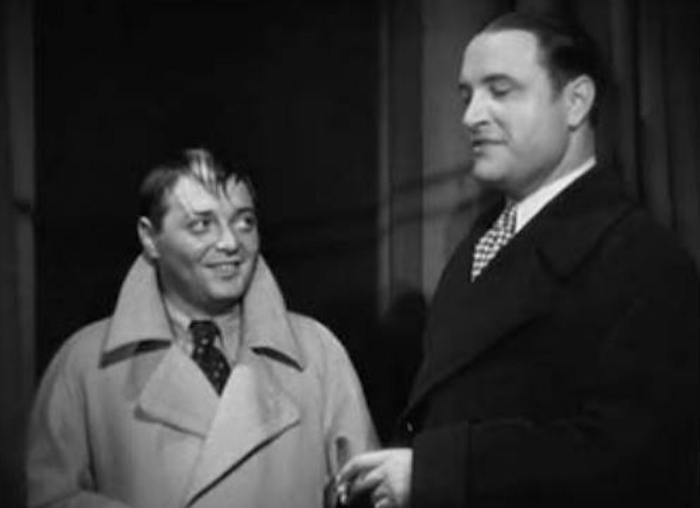
Peter Lorre and Frank Vosper in The Man Who Knew Too Much, 1934
In addition to being an actor, Frank wrote several plays. His first was ‘Spellbound’, which he produced in 1927. He later rewrote it as ‘People Like Us’. In Who’s Who in the Theatre, Vosper amusingly describes his recreations as ‘criminology and blackberrying’. He was a regular visitor to the Old Bailey and ‘People Like Us’ is based on the notorious Thompson-Bywaters case: in October 1922, Edith Thompson persuaded her young lover Freddie Bywaters to murder her husband. The pair were executed in 1923, although many people thought Edith was not guilty of murder and should not have been hanged. The play had a very brief run at the Strand Theatre in 1929, but was banned by the Lord Chamberlain’s office because of the subject matter. It was not performed again until 1948.
Vosper persuaded Agatha Christie to let him adapt her short story into the play ‘Love From a Stranger’. The first night was so tense there were reports that some of the audience fainted. It received very good reviews and ran from March to August 1936. He then took the play to Broadway where it ran for another couple of months later that year. The play was twice turned into a film and was televised by the BBC in 1938 and 1947. A radio version was also broadcast on the BBC Home Service in 1945. Another of his plays ‘Murder on the Second Floor’ was filmed in 1932 and again in 1941 as ‘Shadows on the Stairs’.
By 1935, Frank Vosper was living at 34 Acacia Road in St Johns Wood with his partner, the actor Peter Willes. Willes was born in London on 30 April 1913. He was the son of a lawyer, and educated at Stowe. By now, Vosper was at the height of his career and on 9 September 1936, he and Peter sailed on the SS Aquitania to New York where Frank’s play ‘Love From a Stranger’ was to appear on Broadway. Then in December, Frank and his sister Margery went on holiday to Jamaica and were joined in Mexico by Peter, who had been in Hollywood acting in the film ‘Call it a Day’. After Margaret returned to London, Frank and Peter journeyed on to Havana, Hollywood, and then to New York.
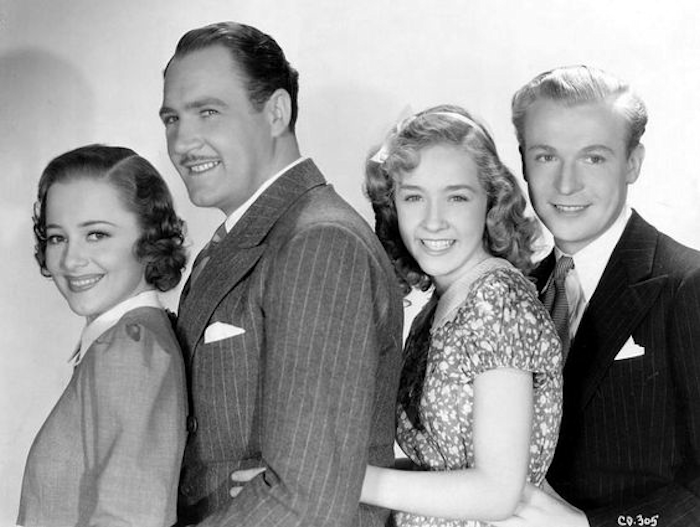
From left Olivia de Havilland Ian Hunter Bonita Granville and Peter Willes, Call it a Day 1937
All at sea
On 6 March 1937, Frank and Peter returned to England having sailed from New York on the SS Paris. Other passengers included the American writer Ernest Hemingway and Muriel Oxford, Miss Great Britain 1935, who – after a couple of small parts in films had been undertaking film tests in Hollywood. Here is a film clip of Muriel at a beauty contest.
In the early hours of that Saturday morning, just before the ship was due in to Plymouth, Frank was reported missing. Just over two weeks later, his body was found more than 200 miles away near East Dean in Sussex.
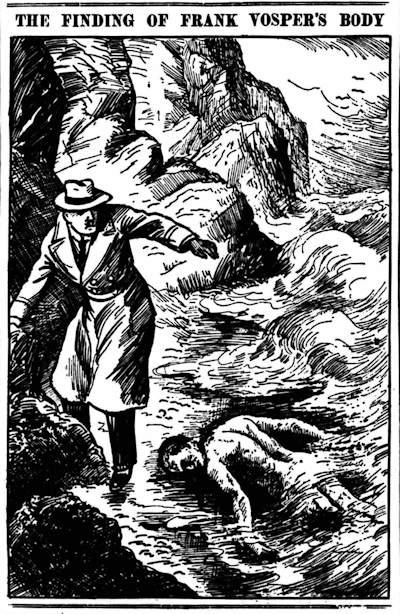
Drawing of finding the body Illustrated Police News 1 April 1937
The papers speculated wildly about what had happened. Peter Willes told reporters that he had met Muriel Oxford at a party on the ship, and that she invited him to her state room where they were joined by Frank. As they drank champagne, Frank had gone into the adjoining lounge where they believed he had climbed out of a window and fallen into the sea. But was it an accident or suicide?
Did he slip, or did he jump?
At the enquiry, Muriel confirmed Peter’s version of events. She had been at a party in the ballroom the night before the ship was due to dock. She had danced with Peter Willes before ordering a bottle of champagne to be taken to her state room. Although she hadn’t met Peter or Frank before, she explained that she asked them to her join her as they were the only Englishmen onboard. Willes had returned to the cabin that he shared with Vosper who reluctantly agreed to go to Muriel’s state room. They sat talking and after about 20 minutes, Vosper got up and walked across the state room to the private lounge. Muriel thought Frank wanted some air and she showed him how to open the window. Later when she and Peter couldn’t find Frank, they raised the alarm.
Peter Willes believed that Frank, who was very short sighted and had broken his glasses, must have thought the low sill of the window led to the boat deck and not straight into the sea. He said Frank always preferred to leave parties unobtrusively so as not to appear rude. But he could not believe Frank had committed suicide. He was far too keen on his work and had spent the whole journey writing a new play.
William Pengelly was Frank’s solicitor and he was determined to find out exactly what had happened. In scenes foreshadowing today’s Crimewatch, he asked Muriel and Peter to reenact the scene on the SS Paris in his Gray’s Inn office. Pengelly also went to Paris to interview Ernest Hemingway who had been travelling on the ship. Hemingway occupied a state room opposite Muriel and strongly denied the press stories that Vosper had argued with people during the voyage, or that Willes had been very attentive to Miss Oxford and that Vosper could have jumped out of the window in a fit of jealousy.
Around the same time, and before a body had been recovered, Peter and Muriel went to Le Havre to help the French examining magistrate by reenacting the events onboard the SS Paris itself. The Magistrate ruled out foul play believing that Vosper committed suicide.
Frank’s badly damaged body was identified by his father Percy. At the beginning of the inquest in Eastbourne, Percy said that Frank was always bright and cheerful and was particularly level headed. He was not keen on parties, and did not stand alcohol very well. But he was not quarrelsome and his father had never seen him drunk. When asked, Percy said he was not aware that Frank had any love affairs. None of the stories in the newspapers revealed that Willes and Vosper were partners.
The inquest, which had begun at the end of March, resumed on 6 April as the jury had decided it could not reach a verdict based only on Muriel and Peter’s evidence. They wanted to hear from the ship’s staff. The court was packed as Robert Cubillare, a night steward, speaking through an interpreter, said that at about 2.15am he had gone to Cabin 243 occupied by Mr Vosper and Mr Willes, and Miss Oxford was there. A lady in an adjoining cabin had complained about the noise, and the steward asked them to keep quiet. A few minutes later the three of them went to Miss Oxford’s state room.
Charles Carbon, the night steward to the state room, said he was summoned at 2.45am. Miss Oxford and Mr Willes were lounging on the divan and were a little merry. Mr Vosper was standing motionless in front of them. When asked if Vosper was laughing or joking, he said Frank was quite silent. Carbon took a bottle of champagne from Miss Oxford and went to put it on ice. When he returned, Frank was missing. He and Mr Willes went to look for Vosper and when they couldn’t find him, the Captain was informed.
The Captain said he was told about Vosper’s disappearance about 3.10am, but he did not think anyone could have got through the small window, and as nobody had seen a man fall overboard, he thought that Frank had simply left the cabin to take some air on the deck. He only reported Frank’s disappearance when they reached Plymouth in the morning. Questioned by Mr Pengelly who represented the families, the Captain admitted he had found some marks on the white window sill.
In his evidence, Mr Pengelly said he known Frank Vosper for 11 years and his financial position was good. He confirmed Vosper was rather sensitive about his poor eyesight and would never wear his glasses in public. Pengelly said he thought it was perfectly possible to step through the window despite what the Captain had said. To demonstrate, he placed a cardboard frame the same size as the window easily over his shoulders. He thought that if Vosper believed there was a deck on the other side then he could have fallen by accident.
The coroner in addressing the jury, said there appeared little doubt that Mr Vosper had gone through the window. The only question that remained was whether he had done so deliberately to end his life, or was he under the impression that there was a deck on which he would land, in which case it would have been an accident. If it was a case of suicide, it must have been a sudden impulse because he had sent a cable from the ship that afternoon to an old friend saying he was landing the next morning.
The jury took just 25 minutes to reach an open verdict on Frank Vosper’s death. They decided that he met his death by drowning, but it was impossible to say how he got into the water.
What became of the other cast members?
After the inquest, Muriel Oxford, white-faced and angry, told reporters, There was no love making in my state room. These stories are the hardest thing to bear. We were not lying on the settee; we were sitting side by side with our backs against the wall. I deny the stories that Willes and I are in love.
In November 1937, she successfully sued the Daily Mail and the Daily Mirror for making libellous claims about her morality. The solicitors representing the newspapers apologised and said there was no intention of making such aspersions. There was no mention of any financial recompense, though there may have been an out-of-court settlement.
The disappearance of Frank Vosper gave rise to the cruel saying, ‘Never get on a ship with Peter Willes’, which was still in circulation in the 1960s. Willes would go on to have a successful career nonetheless. He appeared in ‘The Dawn Patrol’ (1938) with David Niven – a classmate at Stowe, and ‘Idiot’s Delight’ (1939) with Clark Gable. After a distinguished war service, in 1947 he became the tour manager for popular comedian Vic Oliver. This proved good training for his TV work at Associated Rediffusion as a talent scout and producer. Willes produced TV plays by Harold Pinter and Arthur Miller’s ‘A View from the Bridge’. From 1966 to 1978, he was the innovative Head of Drama at Yorkshire Television and produced several Joe Orton plays. Willes became a good friend of Orton’s but disliked Orton’s partner Kenneth Halliwell who eventually killed Orton and then committed suicide in August 1967. Peter Willes himself died in Gloucester in 1991.
In his will Frank Vosper left £10,463 (worth about £600,000 today), to his solicitor and executor, William Pengelly.
There is a short news clip about Frank Vosper here:
In 1939, Sir John Gielgud wrote about his friend Frank:
His tragic death two years ago was a great shock to all his friends, and I miss him continually. I knew him well for nearly fifteen years. As a companion he had inimitable gaiety and charm. He was generous to a degree, a delightfully Bohemian and charming host and, as an artist, completely free from jealousy of any kind. He often gave the impression that he behaved selfishly in doing exactly as he liked, but in reality he enjoyed nothing so much as giving pleasure to other people. … His happiest time, while I knew him, was during the brilliantly successful run of his own play, ‘Murder on the Second Floor’. His diversity of talents created quite a sensation with the production of this play, and he was hailed by the public and idolised by his company. His dressing-room at the Lyric Theatre was always crowded with friends and acquaintances, and after the play there would be endless parties which went on till the small hours. But Frank was equally happy with just one or two intimate friends, and later he bought and furnished a beautiful little house in St. John’s Wood, ceased to entertain so widely, and settled down to a positively domesticated existence, writing, doing enormous jigsaw puzzles, and joking about how busy everyone else always seemed to be.
Unfortunately, we are left not knowing what really happened to the multi-talented Frank Vosper, who tragically died aged just 36.


